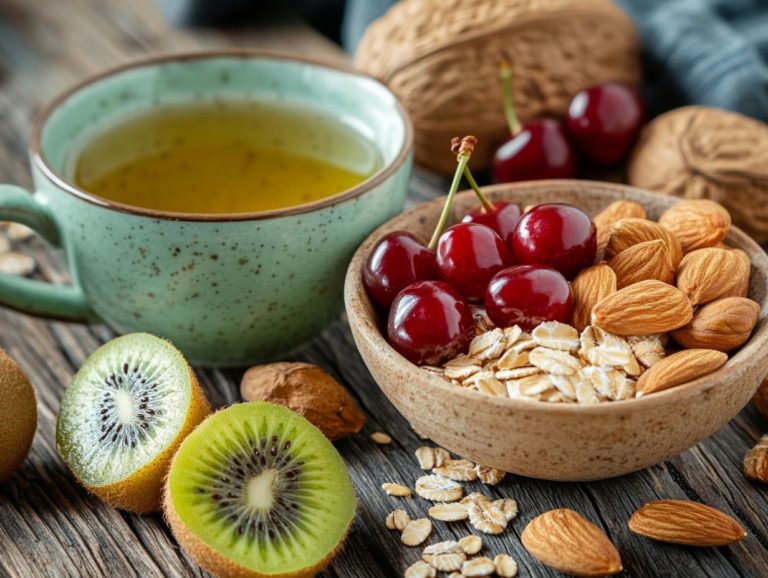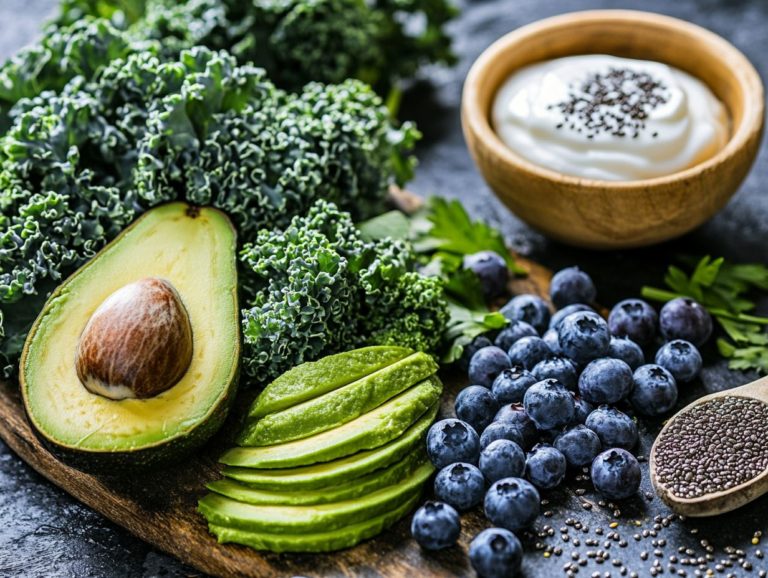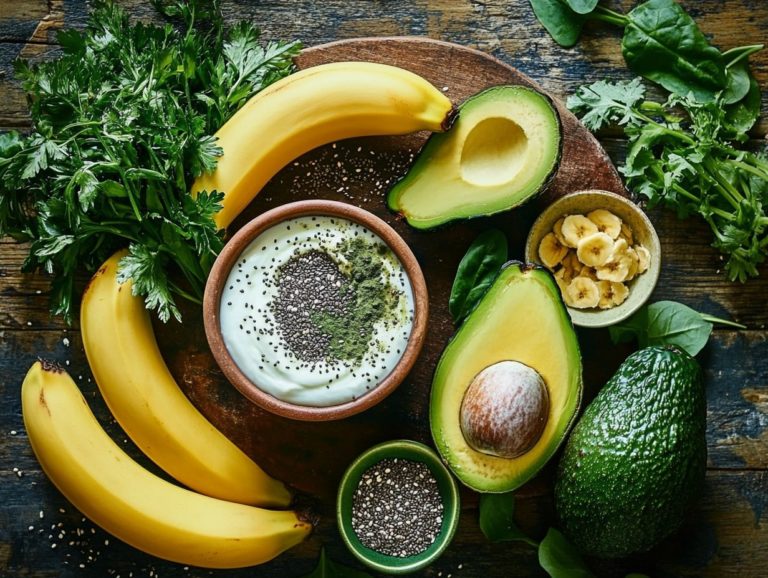5 Superfoods That Fight Inflammation
Inflammation is the body s natural response. However, chronic inflammation can lead to many health issues.
Nature offers powerful allies in superfoods to help fight this persistent inflammation.
Consider five standout superfoods: turmeric, berries, leafy greens, ginger, and fatty fish. These foods provide remarkable benefits that reduce inflammation.
You ll discover what inflammation is, how these foods can help, and practical tips for including them in your diet.
We will also cover any risks associated with these superfoods and explore lifestyle changes that can further curb inflammation.
Discover how simple dietary adjustments can significantly impact your overall health!
Contents
- Key Takeaways:
- 1. Turmeric
- 2. Berries
- 3. Leafy Greens
- 4. Ginger
- 5. Fatty Fish
- What Is Inflammation and Why Is It Harmful?
- What Other Lifestyle Changes Can Help Reduce Inflammation?
- Frequently Asked Questions
- What are the top 5 superfoods that fight inflammation?
- How does turmeric help fight inflammation?
- Why are blueberries considered a superfood for fighting inflammation?
- Can salmon really fight inflammation?
- What makes leafy greens a great choice for fighting inflammation?
- How does ginger help with inflammation?
Key Takeaways:
- Turmeric, commonly used in curry dishes, contains curcumin, a compound with powerful benefits that reduce inflammation.
- Berries like blueberries and strawberries are rich in antioxidants and help fight inflammation.
- Leafy greens such as kale and spinach are loaded with vitamins and minerals that improve health and reduce inflammation.
1. Turmeric
This bright yellow spice adds flavor and health benefits to your meals. Turmeric has strong properties that help with inflammation.
Curcumin, the active compound in turmeric, is known for its effectiveness against inflammation-related diseases like arthritis and heart disease.
Incorporate turmeric easily by adding it to soups, curries, or smoothies. You might enjoy a soothing turmeric and ginger tea or bright turmeric rice made with garlic and olive oil.
Mixing turmeric with other anti-inflammatory foods like leafy greens and fatty fish enhances both flavor and health benefits.
2. Berries
Berries are packed with antioxidants that delight your taste buds and support your fight against inflammation.
Each type of berry offers unique benefits. Blueberries boost memory, while strawberries are high in vitamin C and fiber, promoting heart health.
Adding these fruits to your meals is easy and enjoyable. Blend them into smoothies for breakfast or top Greek yogurt for a tasty snack.
3. Leafy Greens
Leafy greens like kale, spinach, and Swiss chard are your nutrient-dense allies in an anti-inflammatory diet. They re bursting with essential vitamins, minerals, and antioxidants that work together to help reduce inflammation and support your overall health.
These vibrant greens are packed with vitamins A, C, and K, along with minerals like iron and calcium. This makes them crucial for boosting your immune system, supporting bone health, and caring for your skin.
If you re looking to creatively increase your greens intake, think of salads as your colorful canvas. Toss together a variety of leafy options with an array of colorful vegetables, nuts, and dressings for a culinary masterpiece.
You can also incorporate these greens into omelets or stir-fries to add a nutritional punch while elevating flavor and texture. Smoothies present another delightful opportunity to mask the bold flavors of greens. Blend spinach or kale with your favorite fruits and a splash of almond milk to create a refreshing drink that s as delicious as it is nutrient-packed.
4. Ginger
Ginger, that vibrant root found in kitchens around the globe, is renowned not only for its delightful flavor but also for its impressive anti-inflammatory properties. When you incorporate it into your meals, you’re not just elevating taste; you’re also enhancing the benefits of an anti-inflammatory diet, especially when you pair it with other superfoods like turmeric.
This remarkable root is rich in certain natural substances that help fight inflammation, such as gingerol and shogaol. By weaving ginger into your daily meals, you can enjoy a multitude of health benefits.
Whether you steep it into calming teas, simmer it in savory dishes, or blend it into refreshing smoothies, ginger proves to be a versatile ally in your quest for better wellness. Start adding ginger to your meals today for its amazing health benefits!
5. Fatty Fish
Fatty fish, such as salmon, mackerel, and sardines, are treasure troves of omega-3 fatty acids, which help significantly reduce inflammation. This makes them essential components of an anti-inflammatory diet designed to help prevent chronic diseases like cardiovascular issues and autoimmune conditions.
These fish are not only delicious but also incredibly versatile. For example, salmon can be grilled, baked, or poached, allowing you to preserve its nutritious profile while enhancing its flavor. Mackerel is delightful when smoked or broiled, adding a unique twist to your culinary repertoire.
Sardines, often conveniently canned, can easily be tossed into salads, pastas, or spread on whole grain toast for a quick and nutritious meal. Don’t wait! Start including fatty fish in your meals this week for a boost to your health.
Experimenting with different varieties will keep your meals exciting while ensuring you reap a range of health benefits.
What Is Inflammation and Why Is It Harmful?
Inflammation serves as your immune system’s natural response to injury and infection. However, when it becomes chronic, it can lead to serious health issues, including autoimmune diseases, inflammatory bowel disease (IBD), and even neurodegenerative disorders like Alzheimer s. This highlights the importance of understanding and managing inflammation effectively, particularly through dietary strategies.
Acute inflammation is your body s short-term reaction to injury, usually resolving once the issue is addressed. However, chronic inflammation means your body is inflamed for a long time, which can cause serious health problems. It’s often fueled by lifestyle choices like a poor diet, lack of exercise, and elevated stress levels.
This persistent state of inflammation can wreak havoc on your body, contributing to conditions such as heart disease, diabetes, and arthritis. To combat these risks, consider adopting an anti-inflammatory diet rich in fruits, vegetables, and omega-3 fatty acids, while also minimizing your intake of processed foods and sugars.
This approach can help restore balance and promote your overall well-being, putting you back in control of your health.
How Do Superfoods Help Fight Inflammation?
Superfoods, with their lots of nutrients and antioxidants, play an essential role in your fight against inflammation. Incorporating superfoods to help combat anxiety can help reduce inflammation markers and boost your overall health, offering a dietary strategy for minimizing chronic disease risks.
Among these nutritional powerhouses, turmeric shines brightly thanks to its active compound, curcumin. This ingredient has been shown to inhibit inflammatory pathways in your body. Then there are the berries think blueberries and strawberries packed with anthocyanins, potent antioxidants that neutralize free radicals and reduce oxidative stress at the cellular level.
Don t overlook leafy greens like spinach and kale; they re loaded with vitamins and minerals while also providing phytonutrients that support anti-inflammatory processes. When you mix these superfoods, they work together to enhance your body s ability to defend itself against the harmful effects of chronic inflammation.
What Other Superfoods Can Help Fight Inflammation?
Beyond turmeric and berries, you’ll find an array of other superfoods like green tea, dark chocolate, and a mix of nuts and seeds, all of which offer significant anti-inflammatory benefits. Among these, 5 superfoods for healthy digestion can be particularly beneficial. Embracing these options contributes to a comprehensive strategy for reducing chronic inflammation and enhancing your overall well-being.
Green tea, rich in polyphenols (a type of antioxidant), is celebrated for its impressive antioxidant properties. It can be brewed as a morning beverage or blended into smoothies, delivering a refreshing boost to your day. Dark chocolate, especially varieties that contain at least 70% cocoa, isn’t just a delightful treat; it s also rich in flavonoids that support heart health.
Nuts and seeds, such as almonds and chia seeds, provide healthy fats and make for excellent snacks or toppings for salads and yogurt bowls. Mixing these superfoods not only boosts their benefits but makes eating healthy fun!
How Can These Superfoods Be Incorporated into a Diet?
Incorporating superfoods into your anti-inflammatory diet can be easily achieved through various dietary approaches. For instance, integrating 5 superfoods for brain health allows you to enhance your nutrition and develop healthy habits that promote long-term wellness while supporting lifestyle changes aimed at reducing inflammation.
By thoughtfully planning your meals, you ll want to ensure a vibrant variety of nutrient-dense ingredients is at your fingertips. Create a weekly meal plan that includes a colorful mix of fruits, leafy greens, and whole grains, while also integrating powerful superfoods like blueberries, turmeric, and fatty fish.
Making shopping lists based on these selections not only simplifies your grocery trips but also sparks creativity in the kitchen. Trying out easy-to-follow recipes, such as a quinoa salad topped with avocado and walnuts or a vibrant smoothie packed with spinach and chia seeds, can transform your daily eating habits, making healthy choices enjoyable and satisfying.
Are There Any Risks or Side Effects of Consuming Superfoods for Inflammation?
While superfoods are celebrated for their many health benefits, it’s essential to recognize that they may come with potential risks or side effects, especially when consumed in excess or without a clear understanding of your unique health conditions and dietary needs.
Moderation is crucial; overindulging in these nutrient-dense foods can disrupt your body’s balance and potentially lead to adverse effects. Interactions with specific medications can pose serious health risks, so it’s vital to consider your current medications before introducing new superfoods into your diet.
Pre-existing health conditions, such as digestive disorders or allergies, can complicate your dietary choices even further, highlighting the importance of personalized nutritional strategies. If you re unsure about how to safely incorporate superfoods into your meals, consulting with healthcare providers is essential. They can help you craft a comprehensive plan that aligns perfectly with your health goals and requirements.
What Other Lifestyle Changes Can Help Reduce Inflammation?
Embrace an anti-inflammatory diet filled with superfoods. You can also reduce inflammation through effective stress management, maintaining a healthy weight, and cultivating habits that promote overall well-being.
Engaging in regular physical activity like walking, cycling, or practicing yoga boosts circulation and alleviates stress. Mindfulness practices, such as meditation and deep breathing exercises, sharpen mental clarity and help diminish your body’s inflammatory response.
Don t underestimate the power of a good night’s sleep it s vital for your body! Restorative sleep enables your body to repair itself and effectively regulate immune functions.
These lifestyle changes work well with dietary approaches, forming a robust strategy that combats chronic inflammation and enhances overall health.
Frequently Asked Questions
What are the top 5 superfoods that fight inflammation?
The top 5 superfoods to fight chronic fatigue include turmeric, blueberries, salmon, leafy greens, and ginger.
How does turmeric help fight inflammation?
Turmeric contains curcumin, a powerful anti-inflammatory compound that can help reduce inflammation in the body.
Why are blueberries considered a superfood for fighting inflammation?
Blueberries are packed with antioxidants that help reduce inflammation and protect against chronic diseases.
Can salmon really fight inflammation?
Yes, salmon is rich in omega-3 fatty acids, which have anti-inflammatory properties and can help reduce inflammation in the body.
What makes leafy greens a great choice for fighting inflammation?
Leafy greens like kale, spinach, and collard greens contain high levels of vitamins and minerals that help fight inflammation and boost overall health.
How does ginger help with inflammation?
Ginger contains compounds called gingerols, which have anti-inflammatory effects and can help reduce pain and swelling in the body.



